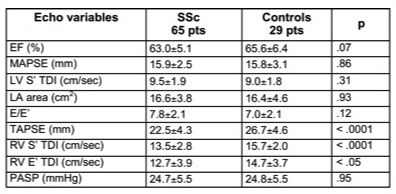Session Information
Session Type: Abstract Submissions (ACR)
Background/Purpose: Cardiac dysfunction in systemic sclerosis (SSc) is associated with poor prognosis. Right ventricular involvement is tipically associated to pulmonary hypertension (PH) in these patients. However, primary myocardial involvement, independently of pulmonary hypertension and without significant renal or pulmonary involvement, may also be present. The aim of the present study was to evaluate left and right ventricular function by transthoracic Doppler echocardiography in SSc patients without PH.
Methods : Sixty-five SSc patients without Doppler-derived signs of PH (49 women, mean age, 46+12 years) and 29 healthy age-matched controls (18 women, mean age 49+15 years, p=ns) prospectively underwent a comprehensive transthoracic 2D and Doppler echocardiography, including tissue Doppler imaging analysis (TDI) of both right and left ventricle.
Results : SSc patients showed similar left ventricular systolic and diastolic function parameters compared to controls, but significantly worse values in systolic and diastolic right ventricular function (see table below), although still within normal limits.
Conclusion : In SSc patients without overt cardiac dysfunction and no PH, borderline right ventricular primary involvement can be detected by transthoracic Doppler echocardiography. The clinical implications of these very early alterations are still to be determined.
Disclosure:
L. Gargani,
None;
P. Gosciniak,
None;
C. Bruni,
None;
S. Guiducci,
None;
S. Bellando Randone,
None;
L. Pratali,
None;
G. Agoston,
None;
A. Moggi Pignone,
None;
A. Varga,
None;
R. Sicari,
None;
E. Picano,
None;
M. Matucci Cerinic,
None.
« Back to 2012 ACR/ARHP Annual Meeting
ACR Meeting Abstracts - https://acrabstracts.org/abstract/borderline-right-ventricular-involvement-in-patients-with-systemic-sclerosis-without-pulmonary-hypertension/

